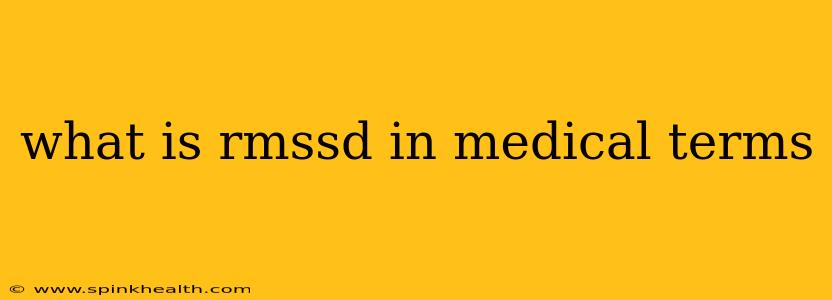What is RMSSD in Medical Terms? Unraveling the Mystery of Heart Rate Variability
Imagine your heart as a finely tuned instrument, its beat a rhythmic dance essential for life. But this dance isn't perfectly uniform; there's a subtle variation in the time between each heartbeat. This variation is called heart rate variability (HRV), and one of its key indicators is RMSSD. Let's delve into what RMSSD means and why it matters.
RMSSD, or root mean square of successive differences, is a specific measure within HRV analysis. It quantifies the beat-to-beat variability of your heart rate, focusing specifically on the short-term fluctuations. Think of it as a reflection of your autonomic nervous system's (ANS) activity – the part of your nervous system you don't consciously control, responsible for things like breathing, digestion, and heart rate regulation.
Understanding the Significance of RMSSD:
A higher RMSSD value generally indicates a more flexible and responsive ANS. This, in turn, suggests better health outcomes. Conversely, a lower RMSSD often points to a less flexible ANS, potentially hinting at underlying health issues. But let's not jump to conclusions – RMSSD is just one piece of the puzzle when assessing overall health.
What does RMSSD measure specifically?
RMSSD specifically quantifies the variation in the time intervals between consecutive heartbeats. It's particularly sensitive to the activity of the parasympathetic nervous system (PNS), often called the "rest and digest" system. A robust PNS helps regulate your body's response to stress, promoting relaxation and recovery.
How is RMSSD measured?
RMSSD is calculated from a continuous electrocardiogram (ECG) recording. Specialized software analyzes the R-R intervals (the time between consecutive R-waves on an ECG, representing the heart's contractions) and performs the mathematical calculation to derive the RMSSD value. You won't typically calculate this yourself; it's done by professionals using HRV analysis tools.
What is a good RMSSD value?
There's no single "perfect" RMSSD value, as it depends on factors like age, sex, fitness level, and even the time of day. However, generally, a higher RMSSD is considered better, indicating better cardiovascular health and adaptability to stress. A lower RMSSD may suggest reduced parasympathetic tone and potentially increased risk of cardiovascular issues. Always consult with a healthcare professional to interpret your RMSSD within the context of your individual health profile.
What can affect RMSSD values?
Several factors can influence your RMSSD:
- Stress: High stress levels generally lead to a lower RMSSD.
- Sleep: Poor sleep quality often correlates with lower RMSSD.
- Physical activity: Regular exercise, especially endurance training, often increases RMSSD.
- Age: RMSSD tends to decrease with age.
- Underlying health conditions: Certain medical conditions can impact RMSDD.
Can RMSSD predict future health problems?
While RMSSD isn't a crystal ball predicting future illnesses, it's a valuable tool in assessing cardiovascular health and risk. Lower RMSSD values may be associated with increased risk of cardiovascular events and other health issues, highlighting the importance of addressing lifestyle factors like stress management, sleep hygiene, and regular exercise.
What should I do if my RMSSD is low?
If your RMSSD is low, consult a healthcare professional. They can conduct a thorough assessment, considering your overall health status and other risk factors, before advising you on appropriate lifestyle changes or medical interventions.
In Conclusion:
RMSSD provides a valuable window into the intricate workings of your autonomic nervous system. While not a definitive diagnostic marker on its own, it's a significant component of HRV analysis and can be a useful tool for monitoring your health and identifying potential areas for improvement. Always remember that a holistic approach, considering multiple factors and consulting with healthcare professionals, is crucial for accurate interpretation and appropriate management of your health.

